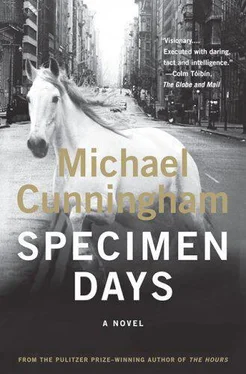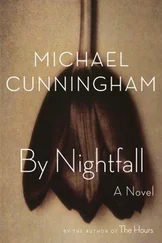Michael Cunningham - Specimen Days
Здесь есть возможность читать онлайн «Michael Cunningham - Specimen Days» — ознакомительный отрывок электронной книги совершенно бесплатно, а после прочтения отрывка купить полную версию. В некоторых случаях можно слушать аудио, скачать через торрент в формате fb2 и присутствует краткое содержание. Город: New York, Год выпуска: 2005, ISBN: 2005, Издательство: Farrar, Straus and Giroux, Жанр: Современная проза, на английском языке. Описание произведения, (предисловие) а так же отзывы посетителей доступны на портале библиотеки ЛибКат.
- Название:Specimen Days
- Автор:
- Издательство:Farrar, Straus and Giroux
- Жанр:
- Год:2005
- Город:New York
- ISBN:0-374-70515-1
- Рейтинг книги:4 / 5. Голосов: 1
-
Избранное:Добавить в избранное
- Отзывы:
-
Ваша оценка:
- 80
- 1
- 2
- 3
- 4
- 5
Specimen Days: краткое содержание, описание и аннотация
Предлагаем к чтению аннотацию, описание, краткое содержание или предисловие (зависит от того, что написал сам автор книги «Specimen Days»). Если вы не нашли необходимую информацию о книге — напишите в комментариях, мы постараемся отыскать её.
Specimen Days — читать онлайн ознакомительный отрывок
Ниже представлен текст книги, разбитый по страницам. Система сохранения места последней прочитанной страницы, позволяет с удобством читать онлайн бесплатно книгу «Specimen Days», без необходимости каждый раз заново искать на чём Вы остановились. Поставьте закладку, и сможете в любой момент перейти на страницу, на которой закончили чтение.
Интервал:
Закладка:
“It’s not.”
She looked at him, steadily and hard. For a moment she thought, What I’m going to do is have another child and raise him far away from all this, in a house in the mountains, by an unpolluted stream where unmutated fish still swim, where we’ll have books and no television, and I’ll do the best I can with the boredom and racism, I’ll manage, I won’t be sitting on some bar stool every night, I’ll stay home and read to the kid, and during the days I’ll work in the local clinic or be a high school counselor or learn to knit sweaters and sell them in fucking crafts fairs. She thought, If you had any sense, Pete Ashberry, you’d want that, too. You’d admit that we’re emigrants, that our native land is too barren for us, too hard; that what we should really and truly do is buy a good reliable used car and drive out into the continent and see what we can find for ourselves.
“I’m sure you’re right,” she said.
“You did a good job. You did the best anybody could have done. You couldn’t have saved this kid.”
And sounded white over the phone
And let him die
And am a cracked vessel, and am an empty cup.
“We’ll never know that, will we?” she said.
“Give yourself a break.”
“Trying.”
“Would it piss you off if I gave you a little advice?”
“That would depend on the advice.”
“Don’t mix any of this up with what happened to your own kid.”
She nodded, tapped her chin with her forefinger. Probably stupid to have told Pete about Luke. You lost track, working with someone every day. You told them things. You had sex with them in the ladies’ room.
She said, “You don’t have some kind of theory going on about me, do you, Pete?”
“No way.”
A silence caught and held. Had she embarrassed him? Had she shamed him? Okay, then, give him something. He’s a good man; he cares about you.
She said, “I didn’t take him to another doctor.”
“You had no reason to.”
“We didn’t have any money. We had shit for insurance.”
“And a doctor told you it was gas. Kids have strange little aches and pains all the time. Gas was a reasonable diagnosis.”
“The wrong one.”
“You didn’t know that.”
/ suspected it. I had a feeling. I decided to believe the doctor. I told myself, kids have strange little aches and pains all the time.
“No,” she said. “I didn’t.”
“So give yourself a break. Can you do that?”
A nick in his heart. He crawled into bed with Daryl and me, said he was thirstier than hed ever been, and died. Right there.
“Sure,” she said. “I can do that.”
The food came. They ate, talked about other things, threw the empty containers out. Pete went back to his office. Cat hung around a little longer, for no good reason. It was all cleanup now, it was investigation; the deranged boys were dead, and the work of finding out who they’d been would fall to others. She dialed Simon’s number. He’d called three times since the event, left messages. He’d believe her when she’d tell him she’d been too busy to call him back, though of course it would be a lie. She was the least busy person on the premises. She’d put off talking to Simon (admit it) because she hadn’t felt up to it, hadn’t felt like being tough and passionate and wised-up.
Amelia put her straight through.
“Cat. God, I’ve been worried.”
“Sorry I couldn’t call earlier. It’s crazy here.”
“Can you get out of there now?”
“Yes. Meet me at your place, okay? Just give me a drink and put me to bed.”
“You got it. I can get out of here in about forty-five minutes.”
Forty-five minutes was good time for Simon. Who knew what fluctuations in the futures needed his immediate attention?
“I’ll come by around nine, then.”
“Good. You okay?”
“Relatively.”
“Good. See you at nine.”
She said good-night to Pete and went out into the streets. She’d wander a while among the terrorized citizenry, until Simon could extricate himself from the particulars of whatever deal he was dealing.
She started down Broadway. If you didn’t know what had happened, you could easily believe it was just another night in the city. The sidewalks were a little less crowded, people were moving with more than the usual degrees of slink or alacrity, but if you were fresh from Mongolia or Uganda you wouldn’t have any but the usual touristic impressions. The city was only being rocked in its less visible parts, along its filaments, in its dreams of itself. People were scared, and yes, it was impossible to know yet just how much money was bleeding out, how many reservations were being canceled, how many corporations were considering relocating, but Broadway was still full of cabs and trucks, stores were still open, unfortunates still worked the passersby for change. The machinery of the city, the immense discordant poetry of the city (thank you, Mr. Whitman), racketed on. You had to bring a building down to make things look different. Tonight there were no candlelight vigils, no mounds of flowers, no women wailing. It all went on.
Four people had gone into space to behold the birth of stars. It all went on. What else should it do?
She browsed the store windows along lower Broadway. She was hungry for normalcy the way she might be hungry for a pastrami on rye. She didn’t want to be herself. Not right now. She wanted, right now, to be a shopper, a regular person, unhaunted, unjaded, free from all but the usual quotients of bitterness and guilt, somebody with a little time to kill on her way to her boyfriend’s place.
The shop windows down here were full of jeans or running shoes or discount cosmetics or every now and then Chinese herbs. The fancier establishments were on the side streets. Broadway was for the young, the semipoor, the easily delighted. She was not young and was not easily delighted. She could have wandered east or west, into different neighborhoods, but then she’d have been window-shopping, and she couldn’t bring herself to do that. Too trivial. She could at best wander slowly along her inevitable route, scanning the windows she’d be passing anyway, beingincidentally trivial, waiting for it to be nine o’clock.
It was just after she’d crossed Canal Street that the feeling arrived again. Someone was watching her. She walked on. She didn’t turn around. Not right away. She waited until she’d reached a shop window (a junk shop, it seemed, didn’t matter what it was). She pretended to be checking out the merchandise, then did a quick glance up the street. Nothing and no one. Okay, a white couple huddled pigeonlike into each other as they negotiated the scraps of windblown trash, and an old woman sitting on a loading dock, dangling her tattered legs over the edge, swinging them like an ancient, exhausted child.
Still, Cat had the feeling. The queasy tingle along the back of her neck.
She refocused, actually looked at the contents of the store window. Gaya’s Emporium. It was a little strange for Broadway more an East Village sort of establishment. Its window was heaped with scavengings: a ratty coat with a fake-fur collar, two pairs of ancient roller skates, a mirrored disco ball, tangles of costume jewelry, a lantern-jawed male mannequin’s head, blandly cheerful under a rainbow Afro wig. Total randomness things that were gathered together because the shop owner had found them somewhere and thought that somebody might conceivably want to buy them. The world overflowed with product, old and new; it was impossible to contain it all. At the lower levels, sheer quantity trumped categorization.
She lingered a moment before the sorrowful bounty. It would look like treasure to most people in the world, wouldn’t it? You had to be among the privileged few to know that this stuff was junk even when it was new, this faux rich-lady coat and this chipped porcelain shepherdess and this bundle of plastic swizzle sticks topped with plastic mermaids.
Читать дальшеИнтервал:
Закладка:
Похожие книги на «Specimen Days»
Представляем Вашему вниманию похожие книги на «Specimen Days» списком для выбора. Мы отобрали схожую по названию и смыслу литературу в надежде предоставить читателям больше вариантов отыскать новые, интересные, ещё непрочитанные произведения.
Обсуждение, отзывы о книге «Specimen Days» и просто собственные мнения читателей. Оставьте ваши комментарии, напишите, что Вы думаете о произведении, его смысле или главных героях. Укажите что конкретно понравилось, а что нет, и почему Вы так считаете.












